ENG 115, Stance Essay: Monitoring Technology Use in Toddlers
VerifiedAdded on 2023/05/29
|7
|1783
|253
Essay
AI Summary
This essay, written for an ENG 115 assignment, delves into the multifaceted effects of technology on toddlers. It argues for the critical need for parental monitoring of screen time, citing potential negative consequences such as eye strain, sleep disturbances, cognitive delays, and behavioral issues. The essay draws on research to support its claims, discussing the impact of excessive technology use on children's physical and mental health, including the risk of screen dependency disorders and decreased physical activity. It emphasizes the importance of balancing technology with outdoor play, promoting healthy sleep cycles, and ensuring a safe distance from screens to mitigate the risks. The conclusion reinforces the role of parents and educators in guiding children's technology use and promoting overall well-being.

Running head: English Essay
English Essay
Name of the Student
Name of the University
Author Note
English Essay
Name of the Student
Name of the University
Author Note
Paraphrase This Document
Need a fresh take? Get an instant paraphrase of this document with our AI Paraphraser
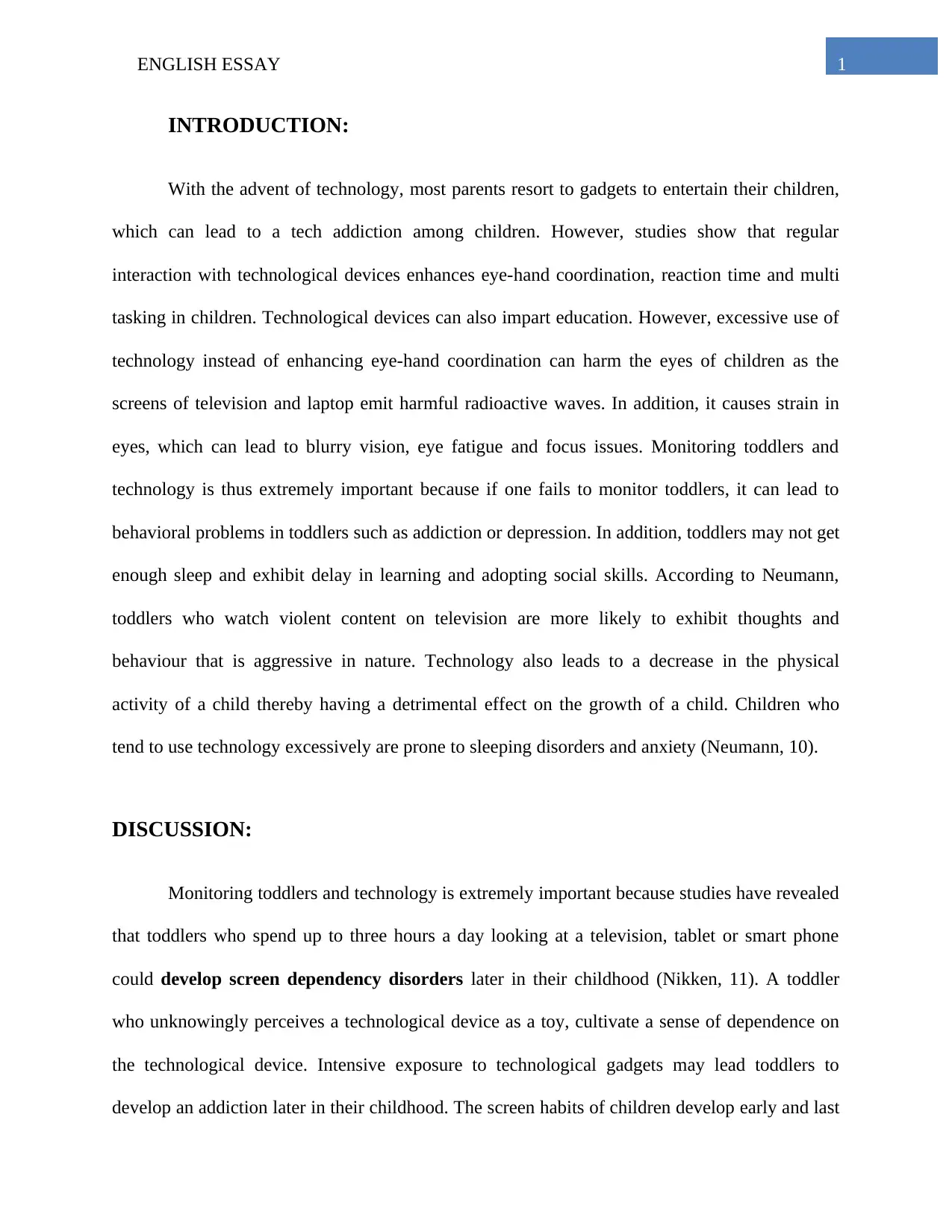
1ENGLISH ESSAY
INTRODUCTION:
With the advent of technology, most parents resort to gadgets to entertain their children,
which can lead to a tech addiction among children. However, studies show that regular
interaction with technological devices enhances eye-hand coordination, reaction time and multi
tasking in children. Technological devices can also impart education. However, excessive use of
technology instead of enhancing eye-hand coordination can harm the eyes of children as the
screens of television and laptop emit harmful radioactive waves. In addition, it causes strain in
eyes, which can lead to blurry vision, eye fatigue and focus issues. Monitoring toddlers and
technology is thus extremely important because if one fails to monitor toddlers, it can lead to
behavioral problems in toddlers such as addiction or depression. In addition, toddlers may not get
enough sleep and exhibit delay in learning and adopting social skills. According to Neumann,
toddlers who watch violent content on television are more likely to exhibit thoughts and
behaviour that is aggressive in nature. Technology also leads to a decrease in the physical
activity of a child thereby having a detrimental effect on the growth of a child. Children who
tend to use technology excessively are prone to sleeping disorders and anxiety (Neumann, 10).
DISCUSSION:
Monitoring toddlers and technology is extremely important because studies have revealed
that toddlers who spend up to three hours a day looking at a television, tablet or smart phone
could develop screen dependency disorders later in their childhood (Nikken, 11). A toddler
who unknowingly perceives a technological device as a toy, cultivate a sense of dependence on
the technological device. Intensive exposure to technological gadgets may lead toddlers to
develop an addiction later in their childhood. The screen habits of children develop early and last
INTRODUCTION:
With the advent of technology, most parents resort to gadgets to entertain their children,
which can lead to a tech addiction among children. However, studies show that regular
interaction with technological devices enhances eye-hand coordination, reaction time and multi
tasking in children. Technological devices can also impart education. However, excessive use of
technology instead of enhancing eye-hand coordination can harm the eyes of children as the
screens of television and laptop emit harmful radioactive waves. In addition, it causes strain in
eyes, which can lead to blurry vision, eye fatigue and focus issues. Monitoring toddlers and
technology is thus extremely important because if one fails to monitor toddlers, it can lead to
behavioral problems in toddlers such as addiction or depression. In addition, toddlers may not get
enough sleep and exhibit delay in learning and adopting social skills. According to Neumann,
toddlers who watch violent content on television are more likely to exhibit thoughts and
behaviour that is aggressive in nature. Technology also leads to a decrease in the physical
activity of a child thereby having a detrimental effect on the growth of a child. Children who
tend to use technology excessively are prone to sleeping disorders and anxiety (Neumann, 10).
DISCUSSION:
Monitoring toddlers and technology is extremely important because studies have revealed
that toddlers who spend up to three hours a day looking at a television, tablet or smart phone
could develop screen dependency disorders later in their childhood (Nikken, 11). A toddler
who unknowingly perceives a technological device as a toy, cultivate a sense of dependence on
the technological device. Intensive exposure to technological gadgets may lead toddlers to
develop an addiction later in their childhood. The screen habits of children develop early and last
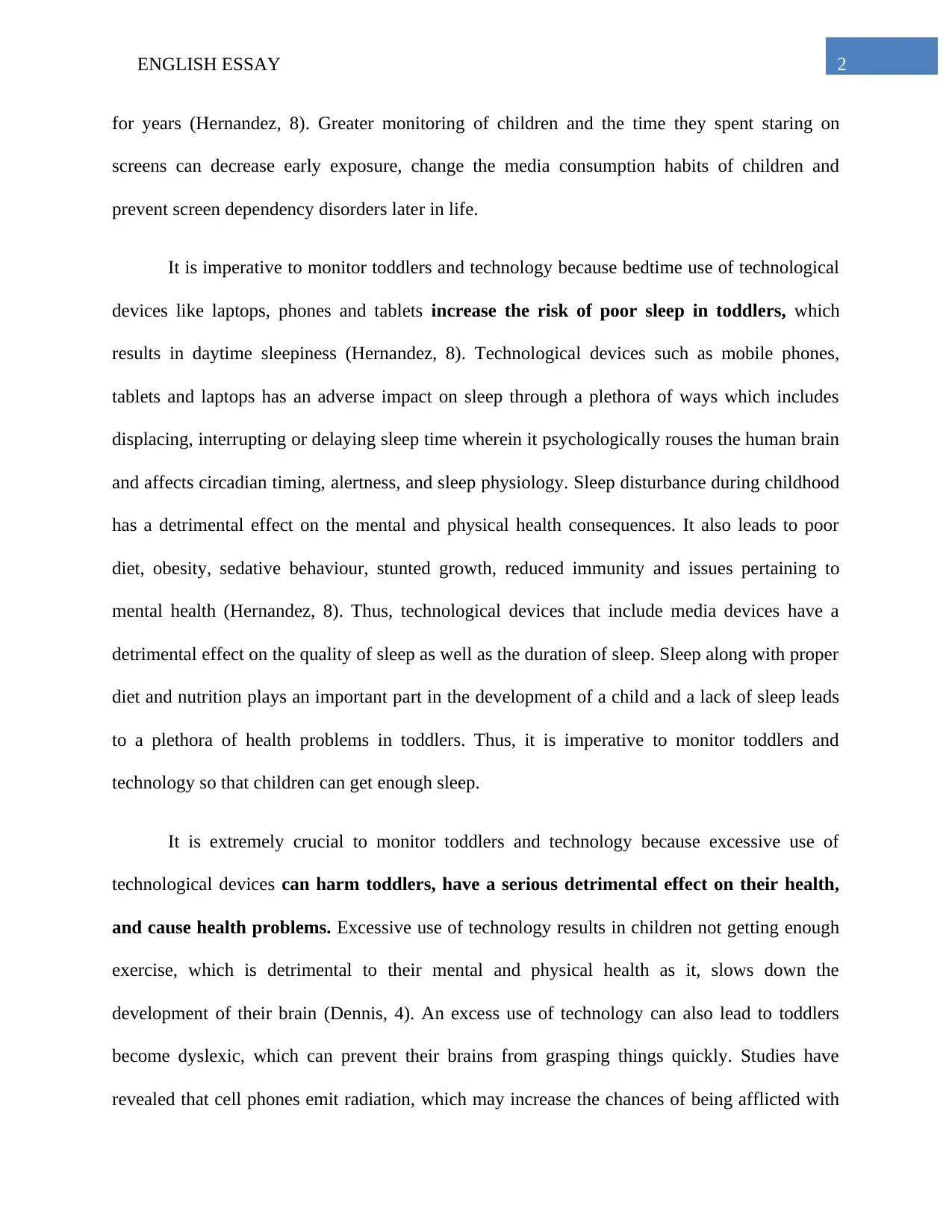
2ENGLISH ESSAY
for years (Hernandez, 8). Greater monitoring of children and the time they spent staring on
screens can decrease early exposure, change the media consumption habits of children and
prevent screen dependency disorders later in life.
It is imperative to monitor toddlers and technology because bedtime use of technological
devices like laptops, phones and tablets increase the risk of poor sleep in toddlers, which
results in daytime sleepiness (Hernandez, 8). Technological devices such as mobile phones,
tablets and laptops has an adverse impact on sleep through a plethora of ways which includes
displacing, interrupting or delaying sleep time wherein it psychologically rouses the human brain
and affects circadian timing, alertness, and sleep physiology. Sleep disturbance during childhood
has a detrimental effect on the mental and physical health consequences. It also leads to poor
diet, obesity, sedative behaviour, stunted growth, reduced immunity and issues pertaining to
mental health (Hernandez, 8). Thus, technological devices that include media devices have a
detrimental effect on the quality of sleep as well as the duration of sleep. Sleep along with proper
diet and nutrition plays an important part in the development of a child and a lack of sleep leads
to a plethora of health problems in toddlers. Thus, it is imperative to monitor toddlers and
technology so that children can get enough sleep.
It is extremely crucial to monitor toddlers and technology because excessive use of
technological devices can harm toddlers, have a serious detrimental effect on their health,
and cause health problems. Excessive use of technology results in children not getting enough
exercise, which is detrimental to their mental and physical health as it, slows down the
development of their brain (Dennis, 4). An excess use of technology can also lead to toddlers
become dyslexic, which can prevent their brains from grasping things quickly. Studies have
revealed that cell phones emit radiation, which may increase the chances of being afflicted with
for years (Hernandez, 8). Greater monitoring of children and the time they spent staring on
screens can decrease early exposure, change the media consumption habits of children and
prevent screen dependency disorders later in life.
It is imperative to monitor toddlers and technology because bedtime use of technological
devices like laptops, phones and tablets increase the risk of poor sleep in toddlers, which
results in daytime sleepiness (Hernandez, 8). Technological devices such as mobile phones,
tablets and laptops has an adverse impact on sleep through a plethora of ways which includes
displacing, interrupting or delaying sleep time wherein it psychologically rouses the human brain
and affects circadian timing, alertness, and sleep physiology. Sleep disturbance during childhood
has a detrimental effect on the mental and physical health consequences. It also leads to poor
diet, obesity, sedative behaviour, stunted growth, reduced immunity and issues pertaining to
mental health (Hernandez, 8). Thus, technological devices that include media devices have a
detrimental effect on the quality of sleep as well as the duration of sleep. Sleep along with proper
diet and nutrition plays an important part in the development of a child and a lack of sleep leads
to a plethora of health problems in toddlers. Thus, it is imperative to monitor toddlers and
technology so that children can get enough sleep.
It is extremely crucial to monitor toddlers and technology because excessive use of
technological devices can harm toddlers, have a serious detrimental effect on their health,
and cause health problems. Excessive use of technology results in children not getting enough
exercise, which is detrimental to their mental and physical health as it, slows down the
development of their brain (Dennis, 4). An excess use of technology can also lead to toddlers
become dyslexic, which can prevent their brains from grasping things quickly. Studies have
revealed that cell phones emit radiation, which may increase the chances of being afflicted with
⊘ This is a preview!⊘
Do you want full access?
Subscribe today to unlock all pages.

Trusted by 1+ million students worldwide
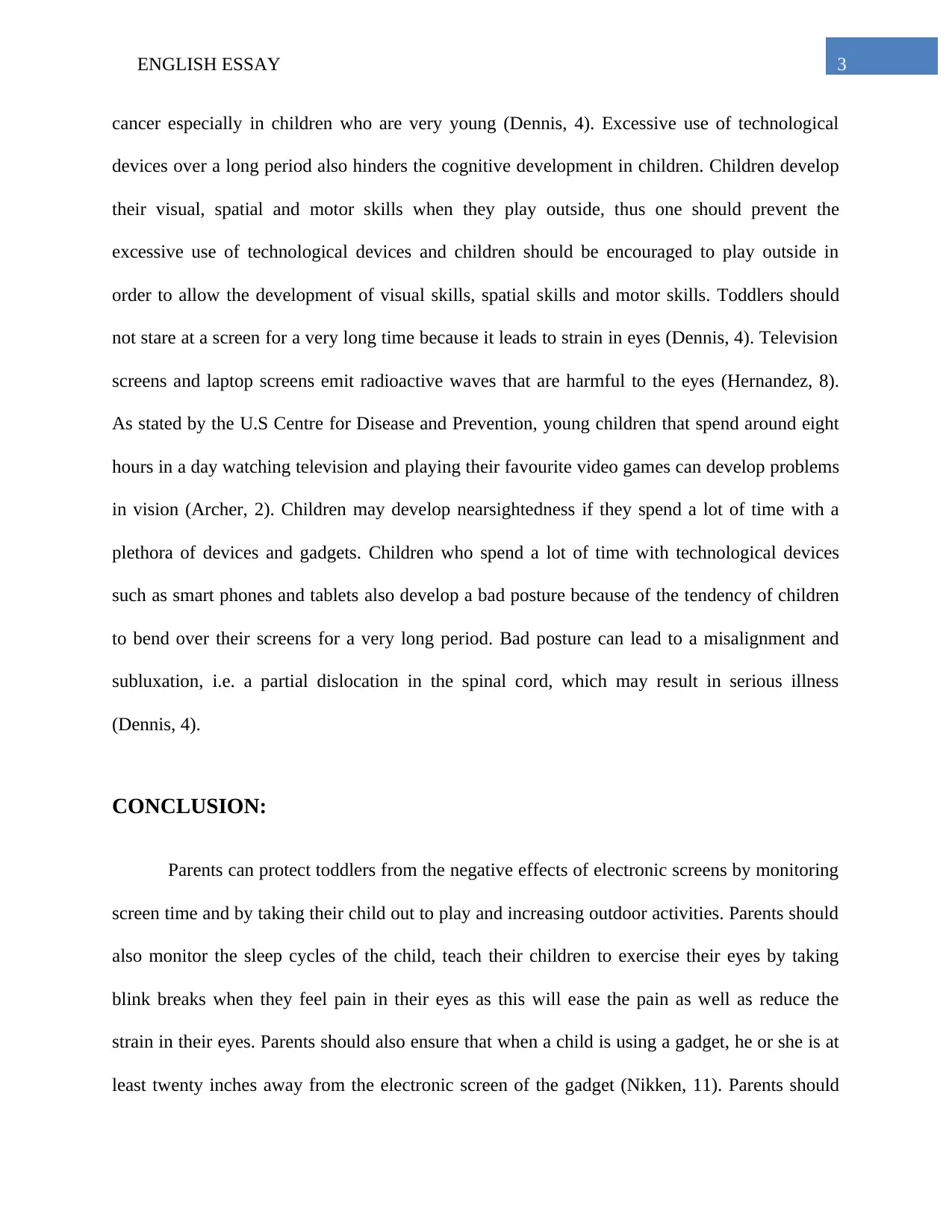
3ENGLISH ESSAY
cancer especially in children who are very young (Dennis, 4). Excessive use of technological
devices over a long period also hinders the cognitive development in children. Children develop
their visual, spatial and motor skills when they play outside, thus one should prevent the
excessive use of technological devices and children should be encouraged to play outside in
order to allow the development of visual skills, spatial skills and motor skills. Toddlers should
not stare at a screen for a very long time because it leads to strain in eyes (Dennis, 4). Television
screens and laptop screens emit radioactive waves that are harmful to the eyes (Hernandez, 8).
As stated by the U.S Centre for Disease and Prevention, young children that spend around eight
hours in a day watching television and playing their favourite video games can develop problems
in vision (Archer, 2). Children may develop nearsightedness if they spend a lot of time with a
plethora of devices and gadgets. Children who spend a lot of time with technological devices
such as smart phones and tablets also develop a bad posture because of the tendency of children
to bend over their screens for a very long period. Bad posture can lead to a misalignment and
subluxation, i.e. a partial dislocation in the spinal cord, which may result in serious illness
(Dennis, 4).
CONCLUSION:
Parents can protect toddlers from the negative effects of electronic screens by monitoring
screen time and by taking their child out to play and increasing outdoor activities. Parents should
also monitor the sleep cycles of the child, teach their children to exercise their eyes by taking
blink breaks when they feel pain in their eyes as this will ease the pain as well as reduce the
strain in their eyes. Parents should also ensure that when a child is using a gadget, he or she is at
least twenty inches away from the electronic screen of the gadget (Nikken, 11). Parents should
cancer especially in children who are very young (Dennis, 4). Excessive use of technological
devices over a long period also hinders the cognitive development in children. Children develop
their visual, spatial and motor skills when they play outside, thus one should prevent the
excessive use of technological devices and children should be encouraged to play outside in
order to allow the development of visual skills, spatial skills and motor skills. Toddlers should
not stare at a screen for a very long time because it leads to strain in eyes (Dennis, 4). Television
screens and laptop screens emit radioactive waves that are harmful to the eyes (Hernandez, 8).
As stated by the U.S Centre for Disease and Prevention, young children that spend around eight
hours in a day watching television and playing their favourite video games can develop problems
in vision (Archer, 2). Children may develop nearsightedness if they spend a lot of time with a
plethora of devices and gadgets. Children who spend a lot of time with technological devices
such as smart phones and tablets also develop a bad posture because of the tendency of children
to bend over their screens for a very long period. Bad posture can lead to a misalignment and
subluxation, i.e. a partial dislocation in the spinal cord, which may result in serious illness
(Dennis, 4).
CONCLUSION:
Parents can protect toddlers from the negative effects of electronic screens by monitoring
screen time and by taking their child out to play and increasing outdoor activities. Parents should
also monitor the sleep cycles of the child, teach their children to exercise their eyes by taking
blink breaks when they feel pain in their eyes as this will ease the pain as well as reduce the
strain in their eyes. Parents should also ensure that when a child is using a gadget, he or she is at
least twenty inches away from the electronic screen of the gadget (Nikken, 11). Parents should
Paraphrase This Document
Need a fresh take? Get an instant paraphrase of this document with our AI Paraphraser

4ENGLISH ESSAY
also ensure that toddlers do not use technological gadgets in the dark or in the sunlight. Using
technological devices in the dark or in a lot of light may lead to a strain on the eyes of a child
(Archer, 2). Thus, parents and childhood educators should monitor toddlers and ensure that they
do not spend too much time with technological gadgets and devices.
also ensure that toddlers do not use technological gadgets in the dark or in the sunlight. Using
technological devices in the dark or in a lot of light may lead to a strain on the eyes of a child
(Archer, 2). Thus, parents and childhood educators should monitor toddlers and ensure that they
do not spend too much time with technological gadgets and devices.
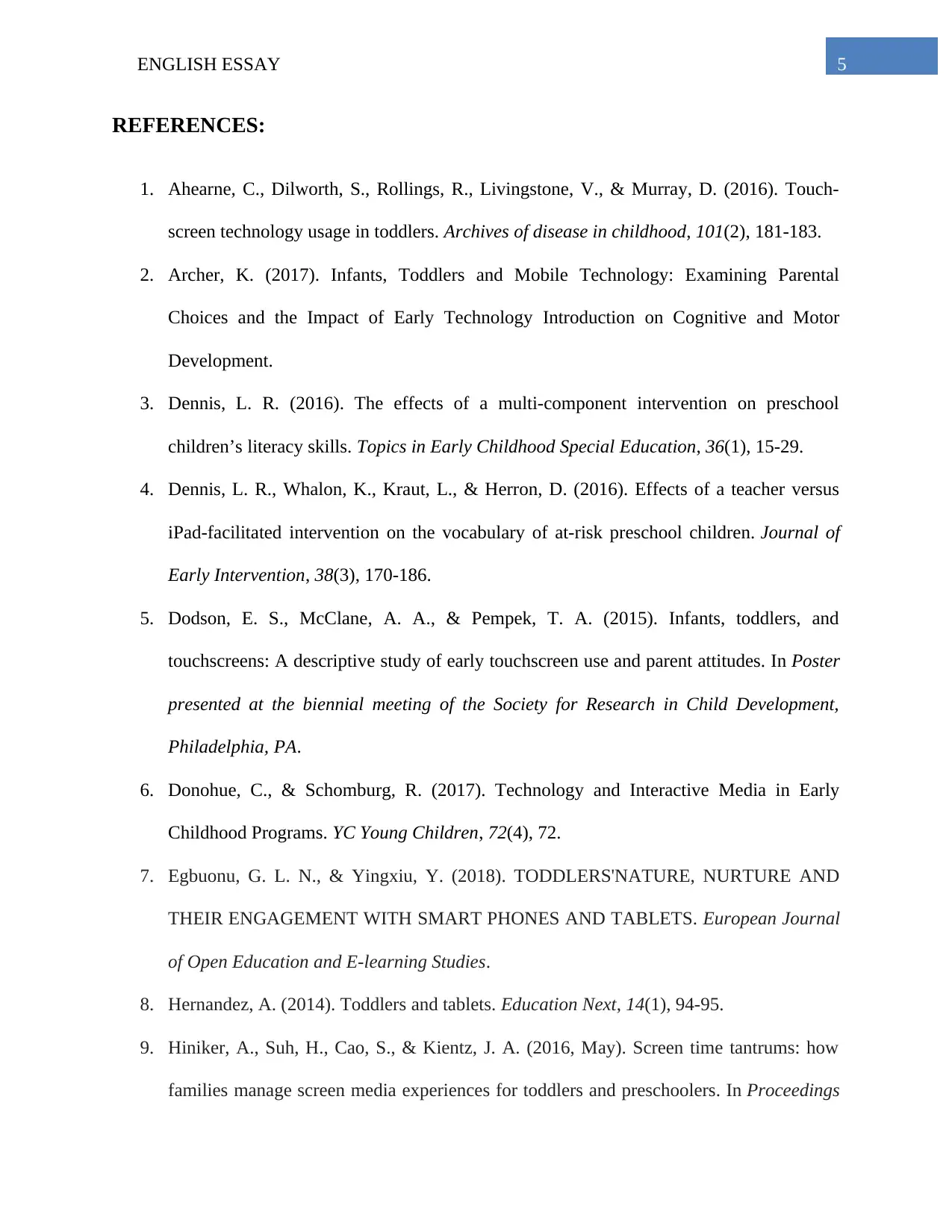
5ENGLISH ESSAY
REFERENCES:
1. Ahearne, C., Dilworth, S., Rollings, R., Livingstone, V., & Murray, D. (2016). Touch-
screen technology usage in toddlers. Archives of disease in childhood, 101(2), 181-183.
2. Archer, K. (2017). Infants, Toddlers and Mobile Technology: Examining Parental
Choices and the Impact of Early Technology Introduction on Cognitive and Motor
Development.
3. Dennis, L. R. (2016). The effects of a multi-component intervention on preschool
children’s literacy skills. Topics in Early Childhood Special Education, 36(1), 15-29.
4. Dennis, L. R., Whalon, K., Kraut, L., & Herron, D. (2016). Effects of a teacher versus
iPad-facilitated intervention on the vocabulary of at-risk preschool children. Journal of
Early Intervention, 38(3), 170-186.
5. Dodson, E. S., McClane, A. A., & Pempek, T. A. (2015). Infants, toddlers, and
touchscreens: A descriptive study of early touchscreen use and parent attitudes. In Poster
presented at the biennial meeting of the Society for Research in Child Development,
Philadelphia, PA.
6. Donohue, C., & Schomburg, R. (2017). Technology and Interactive Media in Early
Childhood Programs. YC Young Children, 72(4), 72.
7. Egbuonu, G. L. N., & Yingxiu, Y. (2018). TODDLERS'NATURE, NURTURE AND
THEIR ENGAGEMENT WITH SMART PHONES AND TABLETS. European Journal
of Open Education and E-learning Studies.
8. Hernandez, A. (2014). Toddlers and tablets. Education Next, 14(1), 94-95.
9. Hiniker, A., Suh, H., Cao, S., & Kientz, J. A. (2016, May). Screen time tantrums: how
families manage screen media experiences for toddlers and preschoolers. In Proceedings
REFERENCES:
1. Ahearne, C., Dilworth, S., Rollings, R., Livingstone, V., & Murray, D. (2016). Touch-
screen technology usage in toddlers. Archives of disease in childhood, 101(2), 181-183.
2. Archer, K. (2017). Infants, Toddlers and Mobile Technology: Examining Parental
Choices and the Impact of Early Technology Introduction on Cognitive and Motor
Development.
3. Dennis, L. R. (2016). The effects of a multi-component intervention on preschool
children’s literacy skills. Topics in Early Childhood Special Education, 36(1), 15-29.
4. Dennis, L. R., Whalon, K., Kraut, L., & Herron, D. (2016). Effects of a teacher versus
iPad-facilitated intervention on the vocabulary of at-risk preschool children. Journal of
Early Intervention, 38(3), 170-186.
5. Dodson, E. S., McClane, A. A., & Pempek, T. A. (2015). Infants, toddlers, and
touchscreens: A descriptive study of early touchscreen use and parent attitudes. In Poster
presented at the biennial meeting of the Society for Research in Child Development,
Philadelphia, PA.
6. Donohue, C., & Schomburg, R. (2017). Technology and Interactive Media in Early
Childhood Programs. YC Young Children, 72(4), 72.
7. Egbuonu, G. L. N., & Yingxiu, Y. (2018). TODDLERS'NATURE, NURTURE AND
THEIR ENGAGEMENT WITH SMART PHONES AND TABLETS. European Journal
of Open Education and E-learning Studies.
8. Hernandez, A. (2014). Toddlers and tablets. Education Next, 14(1), 94-95.
9. Hiniker, A., Suh, H., Cao, S., & Kientz, J. A. (2016, May). Screen time tantrums: how
families manage screen media experiences for toddlers and preschoolers. In Proceedings
⊘ This is a preview!⊘
Do you want full access?
Subscribe today to unlock all pages.

Trusted by 1+ million students worldwide
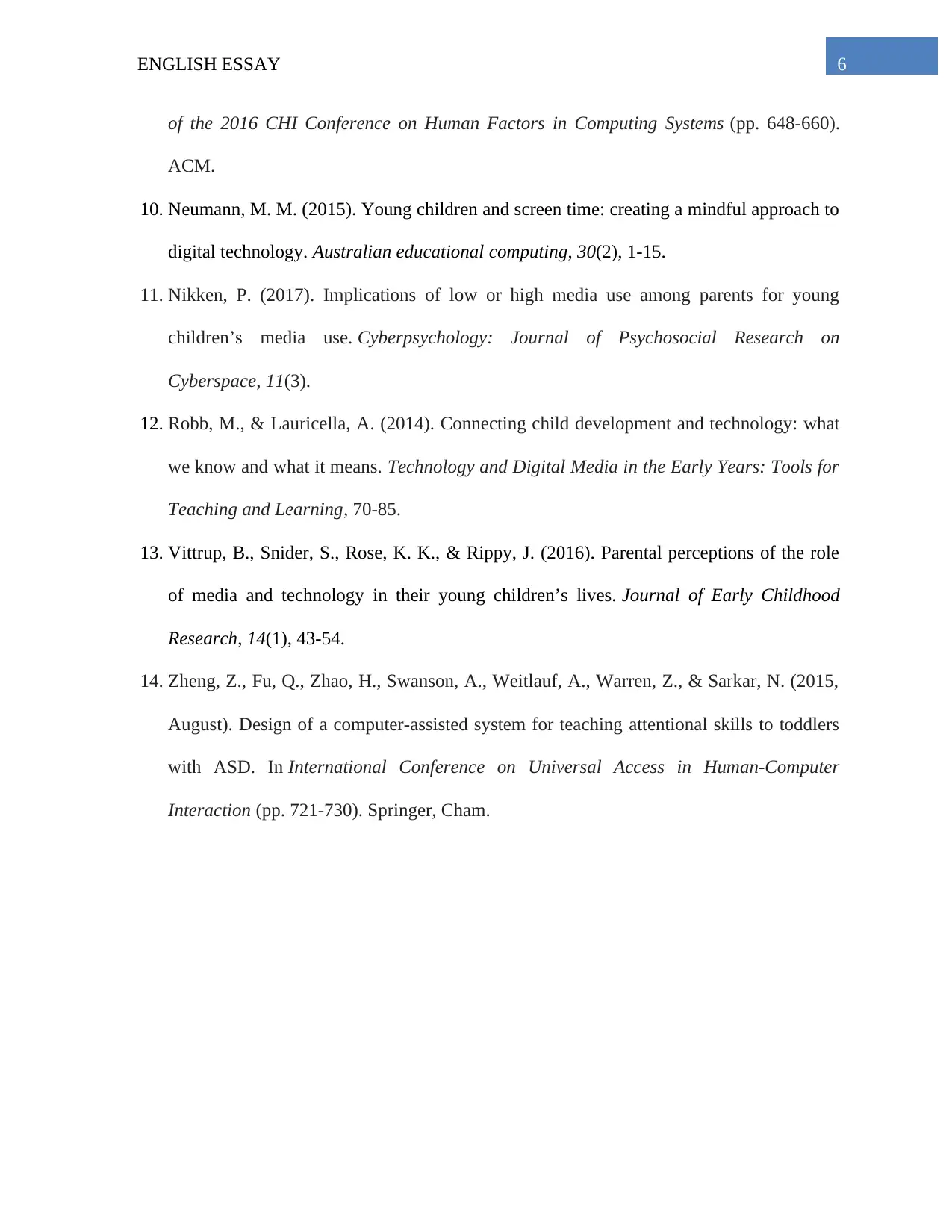
6ENGLISH ESSAY
of the 2016 CHI Conference on Human Factors in Computing Systems (pp. 648-660).
ACM.
10. Neumann, M. M. (2015). Young children and screen time: creating a mindful approach to
digital technology. Australian educational computing, 30(2), 1-15.
11. Nikken, P. (2017). Implications of low or high media use among parents for young
children’s media use. Cyberpsychology: Journal of Psychosocial Research on
Cyberspace, 11(3).
12. Robb, M., & Lauricella, A. (2014). Connecting child development and technology: what
we know and what it means. Technology and Digital Media in the Early Years: Tools for
Teaching and Learning, 70-85.
13. Vittrup, B., Snider, S., Rose, K. K., & Rippy, J. (2016). Parental perceptions of the role
of media and technology in their young children’s lives. Journal of Early Childhood
Research, 14(1), 43-54.
14. Zheng, Z., Fu, Q., Zhao, H., Swanson, A., Weitlauf, A., Warren, Z., & Sarkar, N. (2015,
August). Design of a computer-assisted system for teaching attentional skills to toddlers
with ASD. In International Conference on Universal Access in Human-Computer
Interaction (pp. 721-730). Springer, Cham.
of the 2016 CHI Conference on Human Factors in Computing Systems (pp. 648-660).
ACM.
10. Neumann, M. M. (2015). Young children and screen time: creating a mindful approach to
digital technology. Australian educational computing, 30(2), 1-15.
11. Nikken, P. (2017). Implications of low or high media use among parents for young
children’s media use. Cyberpsychology: Journal of Psychosocial Research on
Cyberspace, 11(3).
12. Robb, M., & Lauricella, A. (2014). Connecting child development and technology: what
we know and what it means. Technology and Digital Media in the Early Years: Tools for
Teaching and Learning, 70-85.
13. Vittrup, B., Snider, S., Rose, K. K., & Rippy, J. (2016). Parental perceptions of the role
of media and technology in their young children’s lives. Journal of Early Childhood
Research, 14(1), 43-54.
14. Zheng, Z., Fu, Q., Zhao, H., Swanson, A., Weitlauf, A., Warren, Z., & Sarkar, N. (2015,
August). Design of a computer-assisted system for teaching attentional skills to toddlers
with ASD. In International Conference on Universal Access in Human-Computer
Interaction (pp. 721-730). Springer, Cham.
1 out of 7
Your All-in-One AI-Powered Toolkit for Academic Success.
+13062052269
info@desklib.com
Available 24*7 on WhatsApp / Email
![[object Object]](/_next/static/media/star-bottom.7253800d.svg)
Unlock your academic potential
Copyright © 2020–2026 A2Z Services. All Rights Reserved. Developed and managed by ZUCOL.